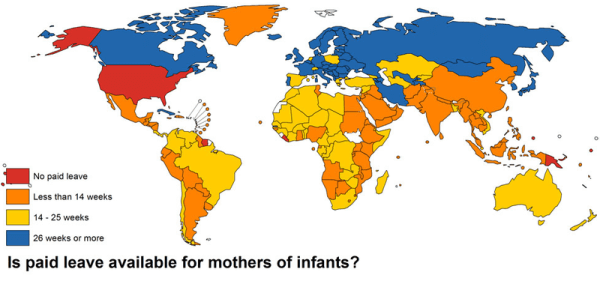San Francisco is officially the first U.S. city to offer six weeks of fully paid parental leave to new parents, covering men, women and same-sex couples who either adopt or bear a child.
The policy, approved in a unanimous vote on Tuesday, will take effect on January 1, 2017 for companies with 50 employees or more, and one year later for companies with 20 employees or more.
Keeping the wage gap alive
While California is already among the just four states that offer paid family leave, none of them do so at full compensation.
San Francisco lawmakers decided to take matters into their own hands, partly because they felt that there was “little hope of change at the national level,” according to the New York Times.
“Whether it’s paid parental leave, infrastructure investment, minimum wage, paid sick leave or addressing carbon emissions, we know the states have to act,” said Scott Wiener, who introduced the bill, to the Times.
The United States is just one of two countries worldwide to offer zero form of federally-mandated paid parental leave to mothers or fathers – the other is New Guinea.
Policies are almost exclusively reserved for mothers; the number of countries offering no paid leave to fathers is nearly three times higher according to the UCLA Work Policy Analysis Center’s website.
While seemingly benevolent, parental leave policies that skew female actually sustain the worldwide gender wage gap.
“If women are the only ones taking advantage of paid parental leave, then women are going to be seen as undedicated at work,” explained Megan Costello in an interview with GenFKD. Costello is the Executive Director of the Office for Women’s Advancement in Boston.
“If both men and women participate in that policy, it will create a new cultural norm in the workplace. It will no longer be a ‘woman’s issue’ or a ‘man’s issue.'”
Making the wage gap “everyone’s issue” has its benefits. Achieving true gender equality in the workplace could add $4.3 trillion to the U.S. economy by the year 2025, according to research from the McKinsey Global Institute.
Cultivating balance in the digital age
Aside from cultivating a more egalitarian workplace culture, advocates of gender-neutral parental leave policies claim they improve retention rates and overall employee satisfaction.
A fixture at tech companies in the neighboring Silicon Valley, paid leave policies help balance out the “always on” nature of work in the digital age. When you can answer emails and write website code from the comfort of your own couch, the line between work and play gets increasingly blurred.
To create a clear divide, younger, more tech-savvy workers often support paid leave policies. When asked to define a successful career, 37 percent of millennial women and 47 percent of millennial men said, “having a healthy work/life balance,” according to a GenFKD survey.
Lawmakers in San Francisco seem to have taken a page out of Silicon Valley’s notebook, with the new law replicating many of the generous, gender-neutral parental leave policies rolled out at cutting-edge companies like Google, Facebook and, as of Tuesday, Twitter.
Is equality but a pipe dream?
Not everyone is in support of sweeping parental leave policies. Business owners in San Francisco are concerned that the new law will place a heavy financial burden on small businesses trying to get off the ground.
The San Francisco Chamber of Commerce cited a “strong belief among many business owners that once again, to the financial detriment of small businesses, a mandate is being adopted in San Francisco that would be better dealt with at the state or federal leave,” as quoted by UPI.
For example, paid parental leave policies could force small business owners to choose between hiring another expensive employee or automating that position to cut costs.
[postquote]
Others feel that paid parental leave policies simply fail to accomplish their goal of helping U.S. families and women in particular.
“[Paid leave policies] can end up discouraging employers from hiring women in the first place, because they fear women will leave for long periods or use expensive benefits,” said the New York Times’ Claire Cain Miller.
Miller cites our Family and Medical Leave act of 1993, which provides female workers with 12 weeks of unpaid leave. After it became law, women were “five percent more likely to remain employed, but eight percent less likely to get promotions than they were before it became law.”
This suggests that while family leave policies may help retain female workers, they do little to close the wage gap or increase the amount of women in C-suite level roles.
Our take
While gender-neutral leave policies are a step towards cultivating equality, they must be utilized by both sexes equally in order to produce the intended result. These policies are good in theory, but not yet in practice; generally speaking, women still assume the role of primary caregiver while men are the breadwinners.
A broader cultural shift must take place before mandating sweeping parental leave policies. As it stands now, gender-neutral paid leave would be utilized along the traditional gender lines we live by, exacerbating our existing issues with equality.
Have something to add to this story? Comment below or join the conversation on Facebook.
Header Image: Justin Sullivan / Getty










































